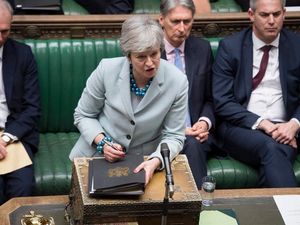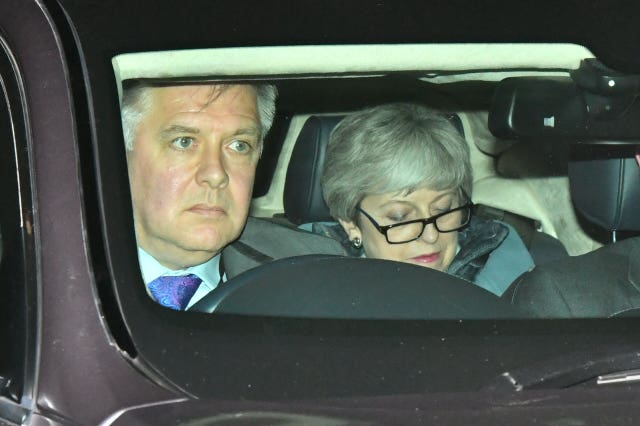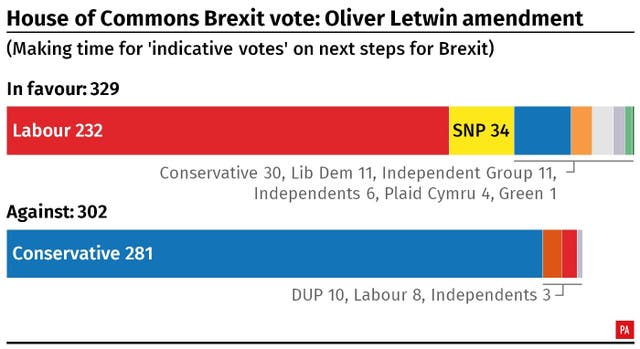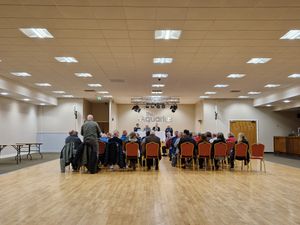May’s Brexit plan in chaos as MPs take control and three ministers quit
The Commons votes to enable MPs to hold a series of indicative votes on alternative proposals.

Theresa May’s Brexit strategy is in disarray after MPs dramatically voted to wrest control of the process from the hands of ministers.
Three pro-EU ministers quit the Government to back a Commons amendment enabling MPs to take control of Commons business to stage a series of “indicative votes” on alternatives to the Prime Minister’s deal.
They were among 30 Conservative MPs to defy the whips and support the cross-party amendment which was passed by 329 to 302 – a majority of 27 – in another humiliating reverse for Mrs May.
Business minister Richard Harrington, who resigned along with Middle East minister Alistair Burt and health minister Steve Brine, said the Government was “playing roulette” with peoples’ lives and livelihoods in its handling of Brexit.
The result means MPs can potentially dictate business of the Commons – normally controlled by the Government – for days to come, potentially paving the way for a “softer” deal that keeps Britain closer to the EU.
Ministers will consider their response at the weekly meeting of the Cabinet in Downing Street on Tuesday.
The Government warned the Monday night vote had set a “dangerous, unpredictable precedent” and said it was essential that any options put forward by MPs were actually “deliverable”.
“This amendment instead upends the balance between our democratic institutions and sets a dangerous, unpredictable precedent for the future,” a spokesman for the Department for Exiting the EU said.
“While it is now up to Parliament to set out next steps in respect of this amendment, the Government will continue to call for realism – any options considered must be deliverable in negotiations with the EU.”
Earlier in a statement to MPs, the Prime Minister warned she would not feel bound by the results of any indicative votes – which could include a softer, Norway-style deal, a second referendum or revoking the Article 50 withdrawal process altogether.
“No Government could give a blank cheque to commit to an outcome without knowing what it is,” she said.

“So I cannot commit the Government to delivering the outcome of any votes held by this House. But I do commit to engaging constructively with this process.”
However one of the leading Tory rebels, former minister Nick Boles, warned that MPs could pass legislation forcing the Government to act if Mrs May tried to ignore their wishes.
“We will be relying on the Government to reflect Parliament’s wishes,” he told the BBC.
“If, ultimately, the Government refuses to listen to what Parliament has voted for then we will look to bring forward a Bill, pass an Act of Parliament that will require the Government to reflect Parliament’s wishes in its new negotiating mandate.”
Labour leader Jeremy Corbyn also warned the Government must “take this process seriously”.
“The Government’s approach has been an abject failure and this House must now find a solution,” he said.
“I know there are many members of this House who have been working for alternative solutions, and we must debate those to find a consensus.”
The successful amendment was tabled by Tory former minister Sir Oliver Letwin with cross-party backing, including from ex-attorney general Dominic Grieve and Labour’s Hilary Benn.
It means MPs will take control of the Commons order paper from 2pm on Wednesday, with Sir Oliver suggesting voting could carry on over several days to establish if there was a proposal the House could coalesce around.

He said the amendment provided for the Commons “to begin the process of working its way towards identifying a way forward that can command a majority in this House”.
He said he believed the first vote should enable MPs to disclose “where the votes lie” on a “plain vanilla basis” – with all votes cast on a paper slip at the end of the debate.
The House, he said, should then seek to establish a method of voting that would enable it to “zero in” on compromise which could command a majority over the course of the coming days.
The vote came after the Prime Minister acknowledged that she still did not have sufficient support to bring back her deal to the Commons for a third “meaningful vote”.
She said she would continue her efforts to build support for the deal – defeated by 230 votes in January and 149 votes in March – and stage a vote before the end of the week.
The European Council last week set a deadline of Friday for her to secure parliamentary approval for her Withdrawal Agreement if the UK is to leave the EU with a deal on May 22.
If she cannot get it through the Commons, then the UK has until April 12 to propose a different approach or crash out of the EU without a deal.
Her admission came shortly after a phone call with DUP leader Arlene Foster, who made clear the Northern Irish party was not giving up its opposition.





